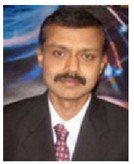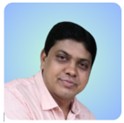 Prof. Dr. Mohan Kolhe
Prof. Dr. Mohan Kolhe Professor (Dr) Mohan Kolhe is with the University of Agder (Norway) as full professor in electrical power engineering with focus in smart grid and renewable energy in the Faculty of Engineering and Science. He has also received the offer of full professorship in smart grid from the Norwegian University of Science and Technology (NTNU). He has more than twenty-five years' academic experience at international level on electrical and renewable energy systems. He is a leading renewable energy technologist and has previously held academic positions at the world's prestigious universities e.g. University College London (UK / Australia), University of Dundee (UK); University of Jyvaskyla (Finland); Hydrogen Research Institute, QC (Canada); etc. He was also a member of the Government of South Australia's Renewable Energy Board (2009- 2011) and worked on developing renewable energy policies. He wasalso leading the EU FP7 Smart Grid-ICT project 'Scalable Energy Management Infrastructure for Household' as Technical Manager (2014-2017). This project was in collaboration with 12 EU partners from 4 EU countries and successfully completed. His academic work ranges from the smart grid, grid integration of renewable energy systems, home energy management system, integrated renewable energy systems for hydrogen production, techno-economics of energy systems, solar and wind energy engineering, development of business models for distributed generation etc. He also did extensive teaching in renewable and electrical energy systems engineering as well as in energy economics. He has been successful in winning competitive research funding from the prestigious research councils (e.g. Norwegian Research Council, EU, EPSRC, BBSRC, NRP, etc.) for his work on sustainable energy systems. He has published extensively inthe energy systems engineering. He has been invited by many international organizations for delivering expert lectures / courses / key note addresses / workshops. He has also been member of many academic promotional committees.
 Dr. Shashwat Rathkanthiwar
Dr. Shashwat Rathkanthiwar
Dr. Shashwat Rathkanthiwar is currently a postdoctoral research scholar with the Department of Materials Science and Engineering at North Carolina State University, USA. Following his undergraduate training in Metallurgical and Materials Engineering from Visvesvaraya National Institute of Technology, Nagpur in 2014, he switched gears to the field of Nano Science and Engineering and obtained his Ph.D. at the Indian Institute of Science, Bengaluru in 2019. He has been associated with the WideBandgaps Laboratory at North Carolina State University as a postdoc since February 2020. In his research journey, Shashwat has authored 24 journal publications with more than 300 citations and 63 conference presentations. One of his publications won the India Most Cited Paper Award from the Institute of Physics Publishing in 2020. Two of his recent publications were selected as the Editor's Pick in Applied Physics Letters. He has received two best oral presentation awards, two best poster presentation awards, and a research excellence award. Two of his closely collaborated research works were awarded the best oral presentation and best poster presentation awards at the Electronic Materials Conference.
 Baylon G. Fernandes
Baylon G. Fernandes
Baylon G. Fernandes (Senior Member, IEEE) received the B.Tech. degree from the National Institute of Technology, Surathkal, India, in 1984, the M.Tech. degree from IIT Kharagpur, Kharagpur, India, in 1989, and the Ph.D. degree from IIT Bombay, Mumbai, India, in 1993. In 1993, he joined the Department of Electrical Engineering, IIT Kanpur, Kanpur, India, as an Assistant Professor. He joined IIT Bombay in 1998, where he is currently a Professor and the Chairman of the Department of Electrical Engineering. He is the Principal Investigator of the National Centre for Photovoltaic Research and Education (NCPRE), IIT Bombay. His current research interests include power electronic converters, motors for electric vehicles, reactive power compensation, and power electronic interfaces for nonconventional energy sources.Dr. Fernandes is an Associate Editor of the IEEE Transactions on Power Electronics.
 Chandrashekhar Narayan Bhende
Chandrashekhar Narayan Bhende
Chandrashekhar Narayan Bhende (Senior Member, IEEE) received the Ph.D. degree from Indian Institute of Technology Delhi, New Delhi, India, in 2008. He is currently working as a Professor with the School of Electrical Sciences, IIT Bhubaneswar, Bhubaneswar, India. His area of interests include power quality, custom power devices, renewable energy sources, and application of soft computing techniques to power systems.
